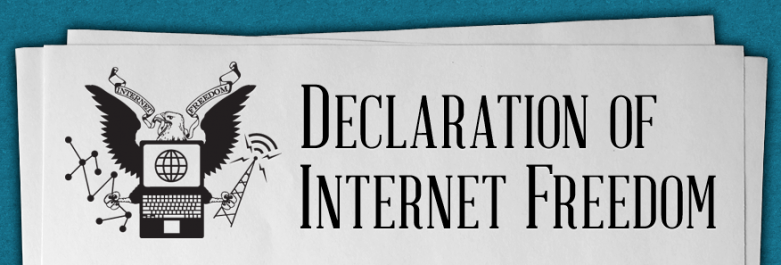
Declare Your Internet Freedom
When millions of Internet users unite, big things happen.
Earlier this year, more than 13 million people joined up to stop twin bills — the Stop Online Piracy Act (SOPA) and the Protect IP Act (PIPA) — that would have irrevocably damaged the open Internet.
As those millions of activists made clear, we shouldn't mess with online openness. It's at the core of why — and how — the Internet has revolutionized culture, politics and community across the globe. If we didn’t have the freedom to express and share what we want online, our laptops, tablets and phones would be little more than 21st-century television sets.
But for years, powerful interests have sought to limit online innovation and free speech. And for years, Internet users have joined together to protect Net Neutrality and fight for universal access to an affordable, high-speed and open Internet.
These battles remind us how fragile the free and open Internet is — and make it clear that if we don't fight to protect it, no one will.
We need to keep engaging in these fights. But we also need to go on the offensive.
So this week more than 100 organizations, academics, startup founders and tech innovators — along with tens of thousands of activists — have signed a Declaration of Internet Freedom. (The signers include Internet pioneer Vint Cerf.) This document contains five principles outlining the basic freedoms that all Internet users should enjoy.
Here's the text:
We stand for a free and open Internet.
We support transparent and participatory processes for making Internet policy and the establishment of five basic principles:
Expression: Don't censor the Internet.
Access: Promote universal access to fast and affordable networks.
Openness: Keep the Internet an open network where everyone is free to connect, communicate, write, read, watch, speak, listen, learn, create and innovate.
Innovation: Protect the freedom to innovate and create without permission. Don't block new technologies, and don't punish innovators for their users’ actions.
Privacy: Protect privacy and defend everyone's ability to control how their data and devices are used.
The release of this document is just the beginning of a movement to secure these five principles — Expression, Access, Openness, Innovation and Privacy — all over the world. You’re encouraged to respond to this document — you can agree or disagree with it, debate it, translate it, make it your own and broaden the discussion. No platform other than a free and open Internet allows this kind of interaction.
The fact is, powerful interests around the world would prefer it if your computer was a TV. That way they could contain political dissent, prop up their aging business models and maintain the status quo.
The power struggle to keep the Internet from becoming yet another locked-down, one-way medium is what the fight to stop SOPA and PIPA was all about. And it continues to this day as Internet users protest overreaching cybersecurity bills (CISPA), harmful international trade agreements (ACTA) and the cable industry’s monopolistic zeal.
Please take a moment to read the Declaration of Internet Freedom and discover all of the ways you can interact with it and help protect the open Internet. I hope you'll agree that these principles are worth fighting for.
If you care about the fight to protect the open Internet, please consider a donation to the Free Press Action Fund.